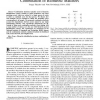Free Online Productivity Tools
i2Speak
i2Symbol
i2OCR
iTex2Img
iWeb2Print
iWeb2Shot
i2Type
iPdf2Split
iPdf2Merge
i2Bopomofo
i2Arabic
i2Style
i2Image
i2PDF
iLatex2Rtf
Sci2ools
TIFS
2008
2008
Use of Identification Trial Statistics for the Combination of Biometric Matchers
Combination functions typically used in biometric identification systems consider as input parameters only those matching scores which are related to a single person in order to derive a combined score for that person. We discuss how such methods can be extended to utilize the matching scores corresponding to all people. The proposed combination methods account for dependencies between scores output by any single participating matcher. Our experiments demonstrate the advantage of using such combination methods when dealing with a large number of classes, as is the case with biometric person identification systems. The experiments are performed on the National Institute of Standards and Technology BSSR1 dataset and the combination methods considered include the likelihood ratio, neural network, and weighted sum.
| Added | 15 Dec 2010 |
| Updated | 15 Dec 2010 |
| Type | Journal |
| Year | 2008 |
| Where | TIFS |
| Authors | Sergey Tulyakov, Venu Govindaraju |
Comments (0)

